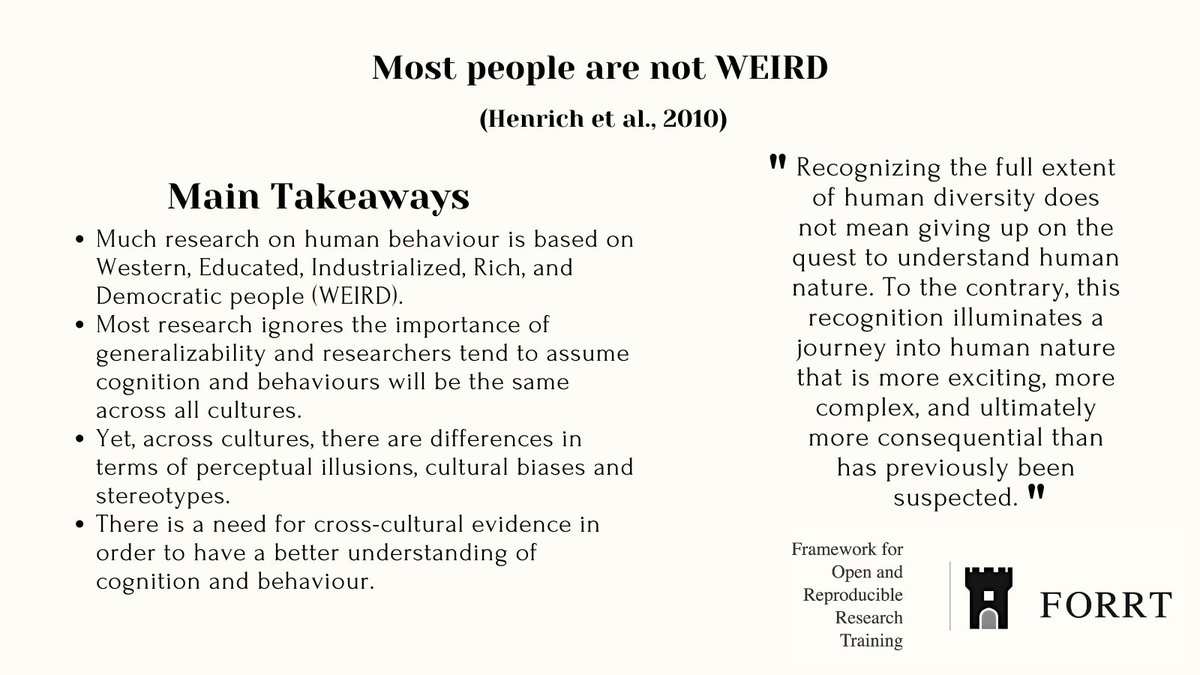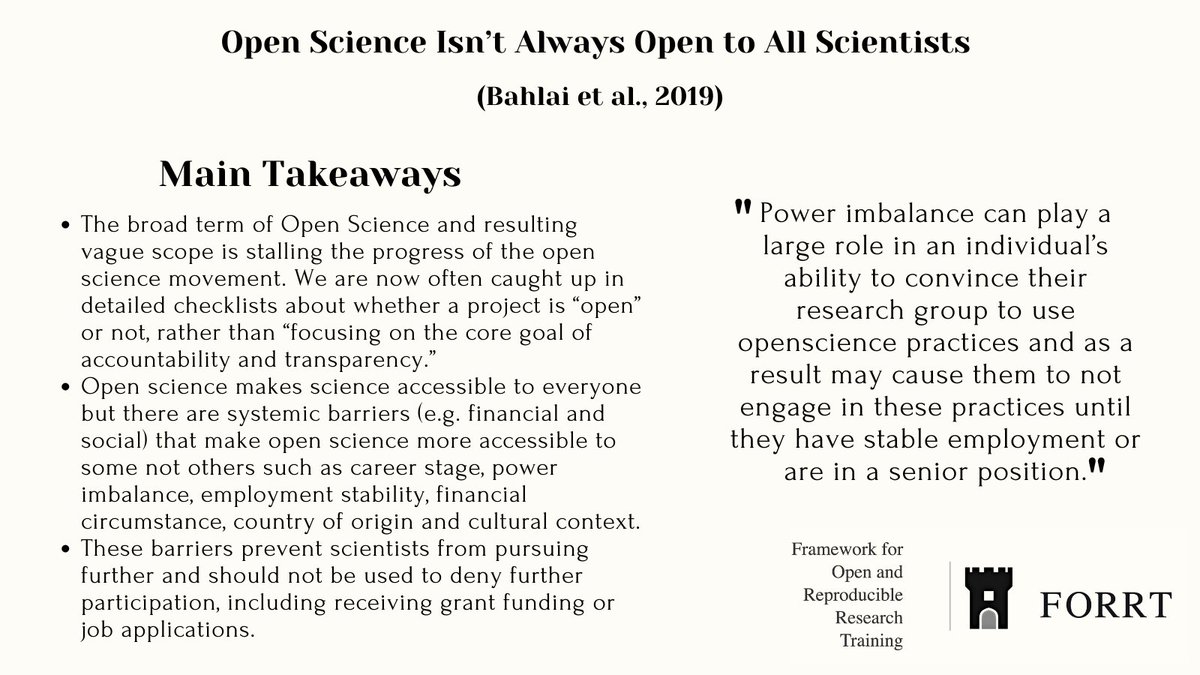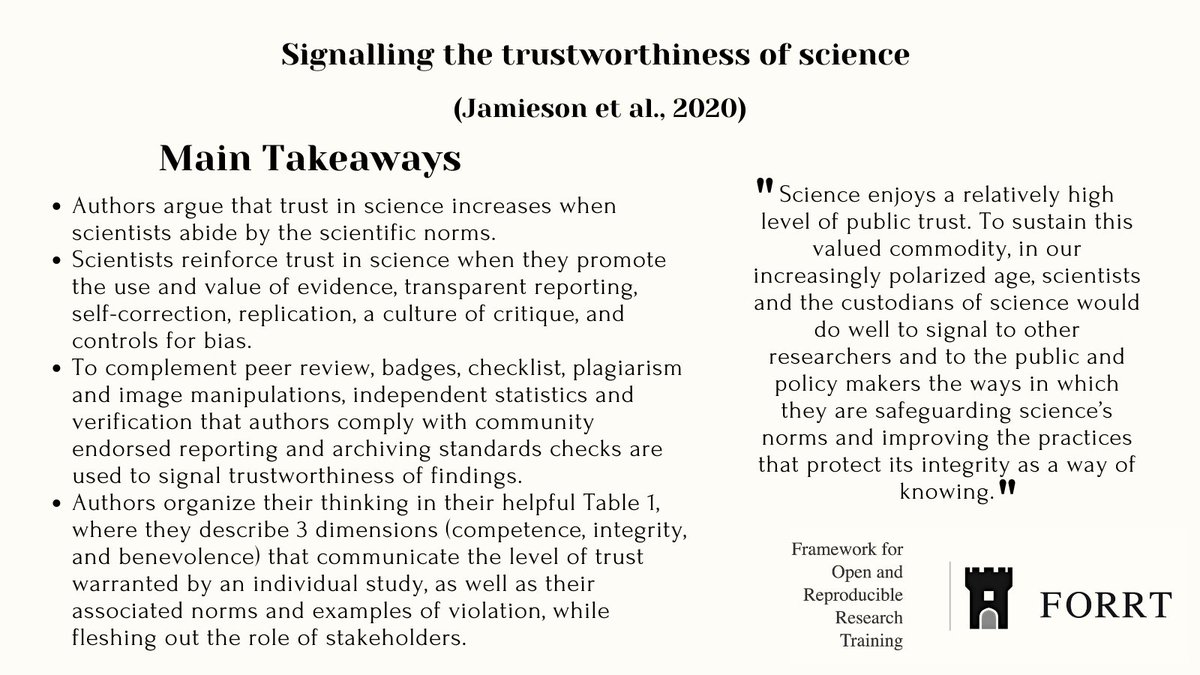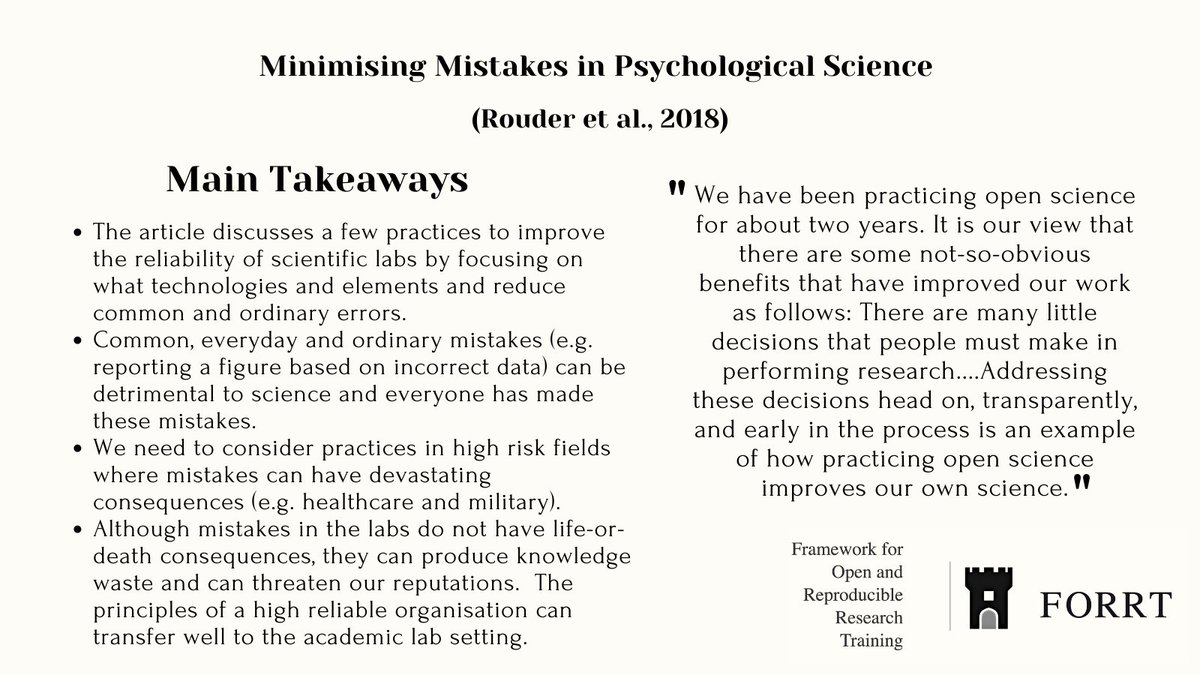
Happy March! What better way to start a new month than by spreading the word on all things #openscience! Over the next month we’ll be sharing 1 summary of #openscience literature every day because you know what they say, an open science paper a day keeps the bad science away! 👏 

If 1 summary just isn’t enough check out the FORRT website forrt.org/summaries/! The summaries are a work in progress & we are always looking for people to contribute their thoughts/ideas - if you’d like to get involved or have comments get in touch we’d love to hear from you!
Kicking off the #OpenScience summaries with 7 Easy Steps to Open Science! The paper provides an introduction to open science and related reforms in the form of an annotated reading list of seven peer-reviewed articles! 👏 

With the landscape of research changing rapidly, what better way to learn about key areas of open scientific working than to be guided along with papers, resources & immediately implementable ideas! 🥳
Link to summary: tinyurl.com/76936f7y
Link to summary: tinyurl.com/76936f7y
While today’s paper has a scarier title than yesterday, it raises equally important ideas that will certainly shake up the way we think about our own #research! Authors share ideas on how science has landed itself in one of the biggest crises yet and proposes some ways forward 📊 

The idea there are researchers that perhaps fish within their data or P-Hack? Awful. The idea this could be you without you realising? Utterly terrifying! But do not fear, have a read for some great ideas on how we can avoid this in our own day-to-day work! #Phew 👏
Today’s paper talks about #registeredreports & a shift from traditional peer review processes. It’s a method where study protocols are reviewed before the experiments are conducted allowing creativity, flexibility & reporting of unexpected findings in the interest of #openscience 

Imagine how thankful your future self will be having started a project with a #registeredreport? Improving the clarity, #reproducibility & quality of science - Tick! Not having to endlessly format manuscripts at the end of a project to try & get your work published - Double tick!
While #academia is full of pressure, it’s also full of authors that have our back! 👏
Today’s paper highlights when it’s fine to fail, especially in a world where #replications are becoming all the more popular (yay!)!
Today’s paper highlights when it’s fine to fail, especially in a world where #replications are becoming all the more popular (yay!)!

Authors challenge the idea that significance = good and anything else is a failure. Instead, Anon asks us to see irreproducibility not a sign of failure, but inspiration for fresh ideas! Yay for scientific progress & #OpenScience! 🤩
Link to summary:tinyurl.com/kx7sfypb
Link to summary:tinyurl.com/kx7sfypb
Today’s paper importantly highlights the structural inequalities that many black scholars continue to face. Authors argue we must do more - could you add the vitally important work of black scholars to your syllabi & invite them to speak at your institution? 

#OpenScience means a science that is open to all. We must actively challenge the environment that academia ordinarily promotes and instead proactively seek change. After all, we are all in this together and science depends upon many minds and should always be inclusive 🌟
This #InternationalWomenDay we ask does the pandemic exacerbate gender inequality in academia? Authors present evidence on work-family trade-off revealing that actually the pandemic might provide an opportunity for to address gender disparities! #OpenScience 

There’s no doubt 2020 left everyone in all situations with a lot to juggle! The paper raises key points about making sure those with lots to contend with are not left behind. Remember to reach out and check in on your colleagues, we’ll all get through this together! 🤗
Link to today's summary here: tinyurl.com/4r6pv438 😀
Today's paper asks scientists to ‘Tell It Like It Is’ when writing up #research. Authors provide a refreshing take on the pressure for papers to tell a perfect story reaffirming that science is indeed messy and that’s okay! 👏#OpenScience 

Next time you write up, try and remember that clean narratives represent a threat to validity and counter reality of what science looks like! Let’s all #TellItLikeItIs at the next opportunity! 😎
Link to summary: tinyurl.com/3j7cpc2v
Link to summary: tinyurl.com/3j7cpc2v
In today’s paper, authors consider a hugely important point - how science can be #open and #inclusive to all! Authors talk about WEIRD participants (Western, Educated, Industrialised, Rich, and Democratic people) that feature heavily in lots of behavioural #research! #OpenScience 

We should be mindful of this fact when conducting our own #research and generalising others’ findings! Let’s try and contribute to some cross-cultural research within our field to further understanding of our area! 👏
Link to summary: tinyurl.com/2tz5x48 😀
Link to summary: tinyurl.com/2tz5x48 😀
Today’s paper links to a previous summary - #TellItLikeItIs! Staggeringly authors reveal 15% of scientists self reported fabricating / manipulating data within the past 3 years! Their explanation for this - publication pressure! #openscience 

While authors present a shocking outcome, remember we are only human & we should acknowledge the pressure of academia. We’re all in this together, reach out to others & be as open a scientist as you can - science is messy and that's okay!
Link to summary: tinyurl.com/5am46vk8
Link to summary: tinyurl.com/5am46vk8
Think about the top 3 scientists relevant to you, are they the most famous researchers in your field? Today’s paper challenges the idea of fame in academia & asks us to remain cautious-we shouldn’t assume that because someone is ‘famous’ their work is more significant than others 

Twitter is a great place to support & promote the names of lesser ‘well known’ but brilliant scientists! We should highlighting excellent researchers & nurture talent within our labs! Name some great scientists you know below (or name yourself, you are excellent at what you do!!)
Link to summary: tinyurl.com/7yjcnmx5 😀
Scientific Utopia, what does that look like to you? In today’s paper authors present the idea of #OnePaperPerYear - limiting scientists’ publications to 1 to evaluate researchers on the quality of their work rather than the quantity of papers they have to their name! #OpenScience 

In a world where researchers are trained to defeat the review process and conquer the publisher, would this make for a better system?
Link to summary: tinyurl.com/4z2jzc4m 😀
Link to summary: tinyurl.com/4z2jzc4m 😀
Today’s paper is about questionable research practices! Authors describe the scope of the problem & focus on how transparency is a part of the solution.They address challenges by providing questions that we can consider to identify & avoid QMPs, thanks Flake & Fried!👏#opensience 

Have a look at the questions authors present - how do they apply to your current / past research? Anyone brave enough to tweet their answers….? After all - transparency is the way forward!
Link to summary; tinyurl.com/m4x2ryvw 😀
Link to summary; tinyurl.com/m4x2ryvw 😀
Have you experienced the help of a mentor along your career journey? Today’s paper aims to empower postdocs & make them active participants in the mentoring relationships. Participants reported learning valuable skills that helped adapting to responsibilities as a faculty mentor 

Collaborative working is positive for all involved & can help to enhance diversity and inclusion of people at all levels in their career! If you’ve had someone that’s supported you in your career, tag them below & give them a virtual high five to brighten their day! #OpenScience
Link to summary; tinyurl.com/8swje3u8 😀
Have you ever co-authored a paper with a senior academic or ‘top scientist’ in your field of research? Building on yesterdays ideas, today’s paper highlights the lasting benefits this can have for junior researchers for their future career! #openscience 👏🥳 

Have you any experiences of writing collaboratively you want to share? Or perhaps you have a paper at the bottom of your long list of things to do that you’d appreciate some support with, reach out & help out at the same time! #WinWin!
Link to summary; tinyurl.com/cvxpwusu 😀
Link to summary; tinyurl.com/cvxpwusu 😀
Lots of our previous papers have considered ways we can be better open scientists - but how open is #openscience? Today’s paper highlights some may be left behind stating it is an unfortunate irony that #openscience practices are not equally accessible to all scientists! 

Open science is a push in the right direction, however all-or-nothing approaches are not the answer. We should welcome any & all steps that scientists take to make science more open & work to remove structural barriers that currently slow or prevent adoption by all scientists! 👏
Link to summary; tinyurl.com/fkr25n9x
What is public trust is like in your area of research? Today authors discuss the important link between our scientific practices/reporting & public trust. They argue researchers should communicate the value of scientific practices to clarify misconceptions of science! 👏 

How vital do you think public trust in science is? And can you think of any additional ways we can increase this additionally to what the authors in today’s papers suggest?
Link to summary; tinyurl.com/3vz86pmx
Link to summary; tinyurl.com/3vz86pmx
Today’s authors talk about constraints of generality! A COG statement indicates why the sample & target population is representative, justifying why subjects, materials, & procedures are representative of broader populations. Authors suggest we should proactively report this! 

Would you post a COG in your paper? Maybe mention it in presentations? Or perhaps you did this already without even realising - yay for transparent reporting! 🥳👏
Link to summary; tinyurl.com/5y3aay3p
Link to summary; tinyurl.com/5y3aay3p
Todays article published in 2019 seems more timely than ever! Authors argue the research community needs to protect & empower the next generation of researchers. Without systemic change to research cultures, mental health could worsen 

Regularly check in on anyone you know doing a PhD, old office friends or someone that’s just joined your department. Doing a PhD is tough. Continuing a PhD in the middle of a global pandemic is extraordinary - let someone know they’re doing an amazing job below! 👏
Link to summary; tinyurl.com/ykecc
Today’s paper questions how we can increase the quality of the data in psychology & cognitive neuroscience labs! Authors highlight the benefits that buddying up with other labs & being open could have on the quality of #research! Yay for #OpenScience 👏 

We think collaborative science is definitely the way forward! What do you think might help the quality of research?
Link to summary; tinyurl.com/yv3pe8y8 😀
Link to summary; tinyurl.com/yv3pe8y8 😀
Today’s paper is an old but incredibly relevant one! Authors outline the file drawer problem - where incentive structures around publishing mean that most non-significant findings are never published, instead being kept at the back of filing cabinets by researchers! 

How far do you think we have come since the publication of this initial paper? Do you think that practices such as pre-registration and registered reports go far enough in ‘solving’ the problem in science for good?
Link to summary: tinyurl.com/5bjv45pn
Link to summary: tinyurl.com/5bjv45pn
Kicking off a final week of summaries with practices designed to increase the reliability of scientific labs! In today’s landscape, new technologies such as cloud storage & computer automation are meant to make life easier. How much of your labs workings are technology based? 

So what do you think, do technologies used within your lab minimise mistakes and human error? Or do you think the use of technology might just shift the error along…..like being stuck as a cat in a zoom meeting?
Link to summary; tinyurl.com/24rw2ev2
Link to summary; tinyurl.com/24rw2ev2
Bad science can have a very detrimental effect when directly implicating clinical decisions. In ref to treatment for depression authors highlight the term ‘spin’ -when treatment is concluded effective despite results on the primary outcome being non-sig - really bad right?! 

Science should do more to allow for the publication of ‘negative findings’ especially in relation to clinical outcome data. We should also be really careful of ‘spin’ and running with results like this, as it could potentially have really negative clinical effects!
Link to summary; tinyurl.com/2t36xwa5
Our final paper looks ahead at the promotion process within academia - a scary thought right?! Authors acknowledge that given criteria has changed over time, it should now evolve to consider candidates attitudes and experiences of reproducible and #openscience 👏 

Have you had the chance to speak about your open and robust science practices at interviews for promotions? Is this something that is considered at your institution? If so, tag them below to let them know they’re doing an amazing job!
Link to summary; tinyurl.com/3peawe6j
Link to summary; tinyurl.com/3peawe6j
So that's it! Thank you to everyone that has engaged with our month of #OpenScience summaries! And don't worry if you're thinking April just won't be the same without a daily summary, check out the FORRT website or even better get in touch to contribute! forrt.org/summaries/
@threadreaderapp please unroll
• • •
Missing some Tweet in this thread? You can try to
force a refresh



